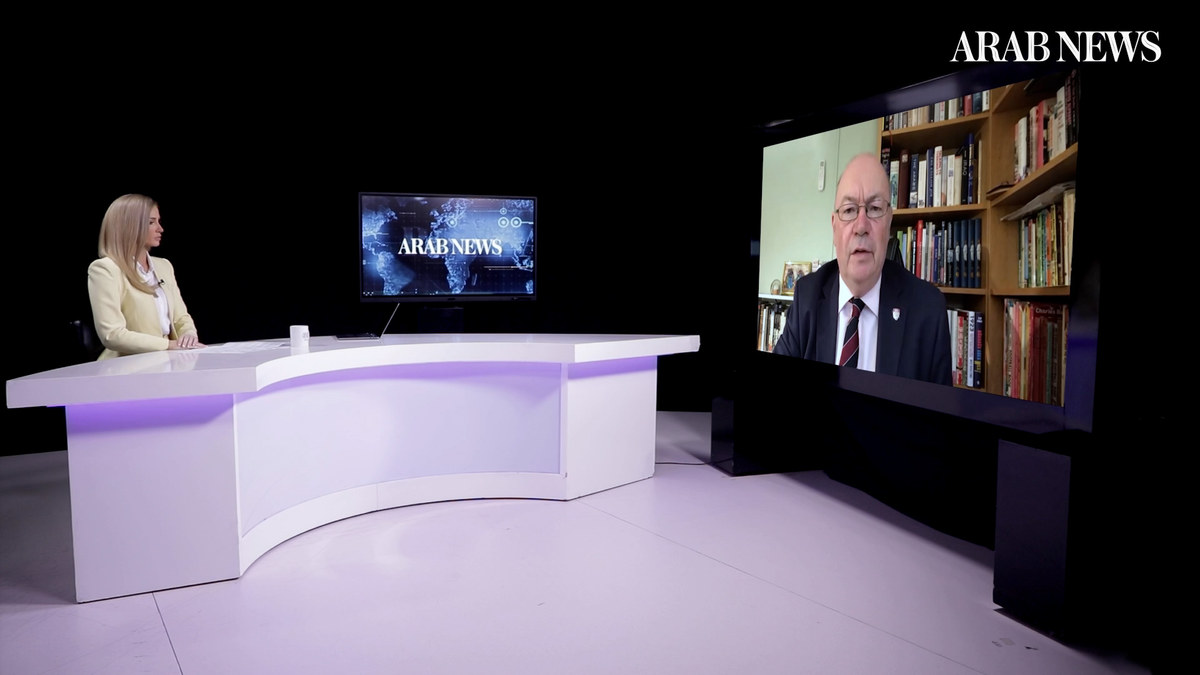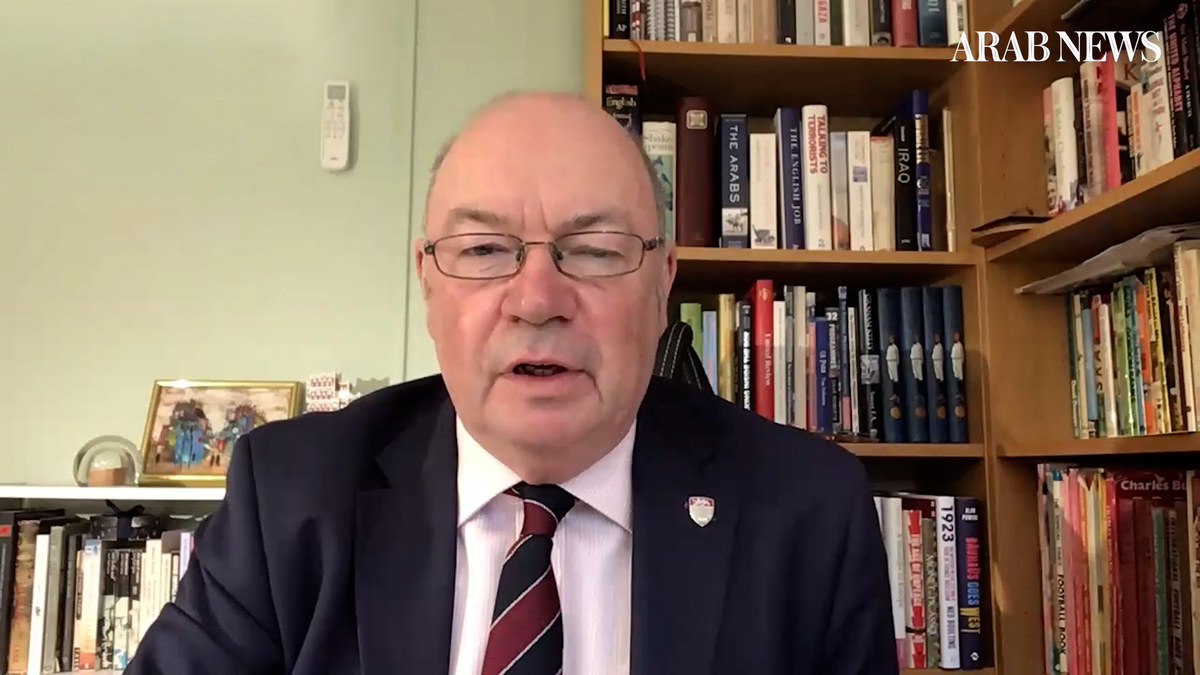DUBAI: Former UK MP and two-time minister of state, the Right Honorable Alistair Burt, has admitted that “policy errors have been made” by the UK government that have affected its relationship with the Arab world, but that the region “remains of great interest and importance” to the country.
Appearing on the Arab News current-affairs talk show “Frankly Speaking,” Burt, who has served as UK minister for the Middle East, said that “the essential thing is that the long historical ties and the relationship between us means there will always be an interest and an involvement.”
Burt, who has visited the region twice this year and still retains close ties with officials and leaders there, explained how his revelation comes as part of a broader recognition of the evolving dynamics in the Middle East and the need to reassess the UK’s role and engagement there.
He stressed the importance of acknowledging past mistakes as an important step toward building better diplomatic relationships in the future, saying that if the government “has made mistakes in the past, we’re very anxious to make sure they’re put right in the future.”
Burt has twice held ministerial positions in the UK Foreign and Commonwealth Office: as parliamentary under-secretary of state from 2010 to 2013 and as minister of state for the Middle East and North Africa from 2017 to 2019.
He argues that the UK still has a “lot of clout in the region,” thanks to its strong trade links, common security interests and “exceptionally good ambassadors throughout the area.”
Taking note of the landmark peace deal that was brokered by China between Saudi and Iran in March, Burt emphasized that this deal could be a turning point in regional politics. Still, he cautioned that ensuring both parties would follow the agreement would be “complex,” adding that “Iran has not always been in a position to deliver on everything it might have signed up.”
That being said, Burt expressed his views on the West taking a back seat in the region’s affairs and that it should be prepared to “watch rather than be involved.” When asked if the deal comes as a “slap in the face” of the West, Burt disagreed with that as a description “because that assumes that everything revolves around us, and it doesn’t.”

Burt, who has served as UK minister for the Middle East, appearing on the Arab News current-affairs talk show Frankly Speaking. (AN Photo)
However, he did note that a more stable Saudi-Iran dynamic could lead to de-escalation in other conflicts, such as the war in Yemen. With the growing willingness to participate in diplomatic dialogue, both countries have the opportunity to de-escalate tensions and redirect their focus toward resolving the decade-long war in Yemen.
Burt has visited Yemen several times and called the crisis there “deeply, deeply distressing” and urged the potential players to create a “peace with compromise.”
He warned that the “total domination of one group over another, whether it’s Houthis or anyone else, is not a basis for long-term stability; it only produces the opportunity for more conflict going forward in the future.”
He cautioned that “the structure of Yemen will have to be looked at. The position of the south and the potential opportunities there for a different constitutional structure.”
The UK has recently appointed a new ambassador to Yemen, lawyer and diplomat Abda Sharif, who is well known and admired by Burt. He called her a “very capable and an outstanding choice of ambassador” for Yemen.
He said that she arrives at a “good time,” but admitted that while the UK’s diplomatic experience will be “looked for” in Yemen, ultimately, the UK will “not be the arbiters” in the conflict.
If the UK government has made mistakes in the past, we’re very anxious to make sure they’re put right in the future.
Alastair Burt
When it came to China’s increased role in the Middle East following its brokering of the Saudi-Iran deal, Burt said that “the region is changing, and I think the region’s influences are changing,” and “China is looking for new opportunities.”
He said he is not surprised by the findings of a recent study conducted by Arab News and YouGov, which revealed that 80 percent of Palestinians would accept a Chinese offer to mediate in its conflict with Israel, underscoring the disillusionment and distrust that exists toward traditional partners.
He added that the study’s findings indicated how “distrusted others have become.” However, he also cautioned against blindly accepting any new entrant’s motives, urging stakeholders to be wary and judge them on “what they do, not just what they say.”
His comments reflect the growing skepticism toward established mediators in the Israeli-Palestinian conflict and highlight the need for fresh approaches to address the longstanding crisis.
Burt, who has long been a vocal advocate of a two-state solution, admitted that “so many in the Palestinian community” have “lost faith in the opportunity of a two-state solution” and “the degree of faith in their leadership.”
He also noted that for a long time, any criticism of Israel’s policies was met with accusations of antisemitism, which has stifled legitimate discussions on the conflict.

Burt also commented on the burning of a copy of the Qur’an outside a mosque in Sweden during the recent Eid Al-Adha holiday during his appearance on Frankly Speaking. (AN Photo)
The former UK politician said his country is “extremely concerned about the actions of the activities of the state of Israel,” and that people now realize they can “be a friend of Israel but not a friend of the government,” and that Netanyahu’s actions toward occupation and settlements should face “legitimate criticisms.”
Burt also commented on the burning of a copy of the Qur’an outside a mosque in Sweden during the recent Eid Al-Adha holiday, which has sparked outrage across the Arab and Muslim worlds.
Swedish police had initially given Salwan Momika, the perpetrator of the crime, a permit for the protest under the country’s free speech laws. Police in Stockholm are now investigating the incident for incitement of hatred. Momika has vowed to repeat his actions within days.
Burt slammed the act, saying: “It’s nothing to do with freedom of expression or freedom of speech. The burning of sacred books as a provocation is always wrong and should always be prevented. Any sensible state would do so.”
He added that the threat posed by the rise in expression of hate is “very, very dangerous and very scary” and said that no one could afford to be complacent, cautioning that it could “spark anywhere.”
Looking into other regional crises, such as Sudan, the UK has been criticized for its lack of decisive action after evacuating diplomats over citizens when fighting broke out in the North African country on April 15.
Burt defended the actions of the government, which resulted in cases such as the death of an elderly disabled British woman who starved after snipers shot her husband, despite repeated calls to the British Embassy that her family says was just meters from their home.
He said that the “sudden outbreak of violence caught a lot of people by surprise,” but that the government “worked very hard to get people out in very difficult circumstances.”
He added that he knew “Foreign Office staff who went out into danger zones in order to seek to ensure that citizens could get away.”
But he admitted that “when conflict arises, you can’t guarantee everyone’s safety … what it demonstrates is that there are almost impossible decisions to make in these circumstances … . I have been involved in hostage situations where we’ve made such a decision, and something has gone wrong, and lives have been lost. So, you can’t always get it right.”




























